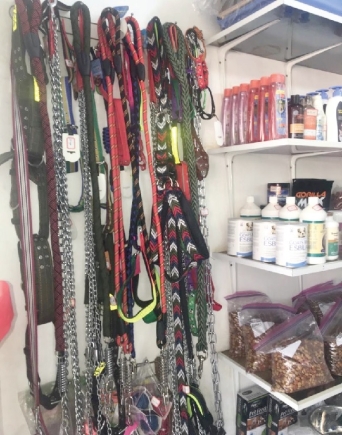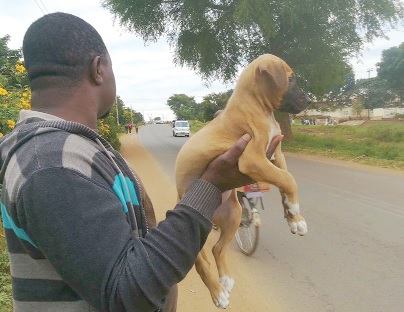A veterinary doctor, Dr Akosua Kumi Nyarko, has cautioned against the purchase of pets, especially dogs, from street hawkers.
She emphasised that some of the animals hawked on the streets are stressed, weak, unimmunised and often carry numerous diseases.
"Veterinarians, including myself, would not recommend buying a pet from the street. These animals often endure long hours in the sun and harsh weather, are cramped in cages, poorly fed, not vaccinated, harbour undetected viruses and not properly groomed. I have seen many animals bought from the roadside admitted to our hospital with serious illnesses within a few days. It is not a good sight to behold,” she said.

Dr Nyarko who has a Doctor of Veterinary Medicine (DVM) degree from the University of Ghana, Legon, Accra (UG) and is a House Officer with the Small Animal Teaching Hospital, UG, was speaking with The Mirror last Wednesday in Accra on proper and effective ways to care for pets.
She added that if someone insisted on buying a pet from the street or any other source, it would be crucial to take all necessary precautions to ensure the pet's safety and health, or else they could die or pose health risks to other animals and people.
She advised that licensed veterinary officers can be of help in recommending a pet home or breeders for one to purchase a pet.
First steps after getting a pet
The Veterinarian recommended taking the animal to an approved and licensed veterinary doctor/clinic for necessary tests, vaccination and deworming.
This she said ensured that any health issues are identified and treated early and the animal is protected from vaccine-preventable diseases.
She added that for the pet’s health, all primary vaccinations should be administered. "For dogs, there is the Canine Distemper Hepatitis Leptospirosis Parainfluenza Parvovirus enteritis (DHLPP) vaccine, which protects against all deadly viral diseases.
This vaccine is given at six weeks, eight weeks, and 12 weeks old, and then repeated every year," explained Dr Nyarko.
“Cats have the Feline Viral Rhinotracheitis Calicivirus Panleukopenia (FVRCP) vaccine which is administered at six weeks and repeated at nine, 12, and 16 weeks of age and then repeated every year.

There is also a rabies shot given at 12 weeks old and repeated every year for both dogs and cats", she explained.
Dieting and grooming
Another important aspect of pet care, Dr Nyarko noted, was feeding and proper grooming. "Pets, like humans, need a balanced diet, that is a mix of proteins, fats, minerals, vitamins and carbohydrates," she explained.
Fortunately, most high-quality pet foods have all the necessary nutrients needed. However, if you intend to cook for your pet, she advised you consult with a veterinarian to create a meal plan.
Touching on grooming, Dr Nyarko stated that “if your furry friend has a lot of hair, daily brushing is necessary to reduce shedding, prevent matting, and check for skin issues or parasites”.
She added that for certain breeds, professional grooming, including nail trimming, bathing, and teeth and ear cleaning, might be necessary if one cannot groom at home.
Recognising signs of illness
Dr Nyarko noted that it was important to be friendly with pets in order to notice any changes in behaviour, which could indicate illness.
"Look out for signs such as withdrawal, hyperactivity, changes in appetite, changes in stool or urination, excessive vomiting and any discharge from the body.
With the right preventive measures, including flea/ticks collars, dental chews, and supplements to support and regular health checkups, pets and their owners are the happiest and healthiest,”Dr Nyarko added.
Training and Socialisation
The Veterinary doctor likened owning a pet to nurturing a baby. “The same way you would train and socialise with your child is the same for a pet to ensure it is well-behaved”, she said.
She said the basic training for dogs, such as “sit, stay, and come”, helped establish good behaviour and strengthened bond between humans and animals.
Cats on the other hand can be trained to some extent, like using a litter box or scratching posts, she noted.
“Training your pet requires consistency and persistency. Use the same language throughout the training. If you start with English, continue with English. Reward good behaviour. Do not shout or beat your pet. Keep training, simple and gradual," Dr Nyarko advised .
She also suggested using interactive toys such as balls for dogs or feather wands for cats, as they were great for exercise and bonding.

Emergency Preparedness
Dr Nyarko said it was important to be prepared for emergencies by suggesting knowledge of the nearest vet clinic, having a first aid kit, as well as a list of emergency contacts.
“Pet owners, do not lie to your veterinary doctors. When you come for appointments and we ask; when last did you feed your pet, has it been taking its medications, vaccines, etc.? Do not lie. It hinders our ability to fully treat the animal”, she said.
She added that just like one would do for a child, there was the need to monitor those allowed to take care of pets, be nice to pets, get a pet that one could afford to properly cater for and always remember that prevention is better than cure.
Pet shop
The Mirror spoke to the resident veterinarian of the Consolata Veterinary Centre and Pet Shop, Mr Albert Donkor.
He said “many people make the mistake of feeding their pets table scraps.
This can lead to obesity and other health problems. Stick to pet foods that are designed to meet all their nutritional needs and look for brands that use natural ingredients avoiding artificial preservatives, colours, and flavours," he advised. He stressed the importance of tailoring dietary needs to specific breeds of pets.

Pet owner
Sharing her experience of owning a Maltese dog, Miss Dorothy Morrison told The Mirror that she spent about GH₵ 1,000 monthly on feeding, training and grooming it. For her, it is worth it because she cherishes the special moments they share.her, it is worth it because she cherishes the special moments they share.

